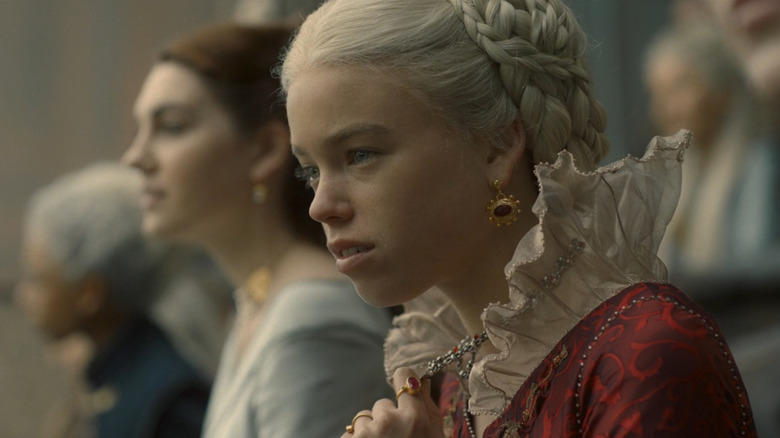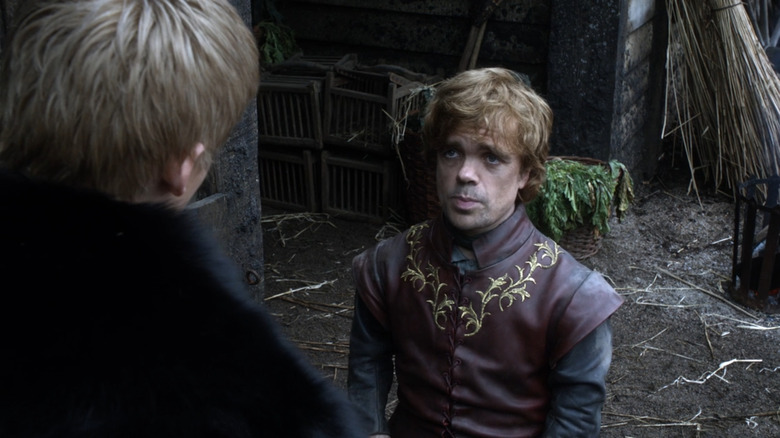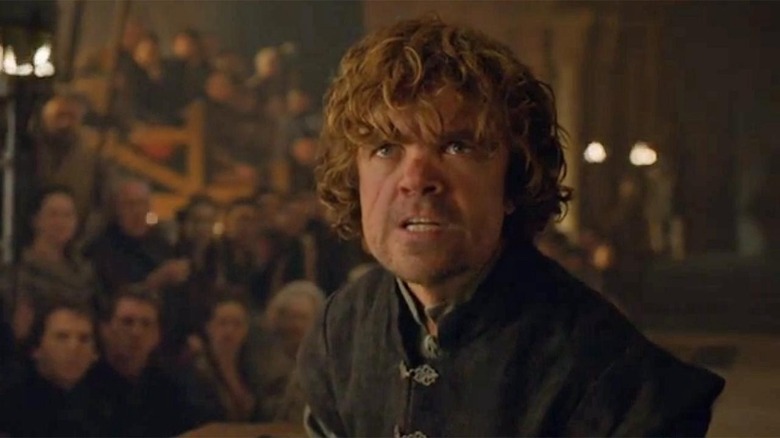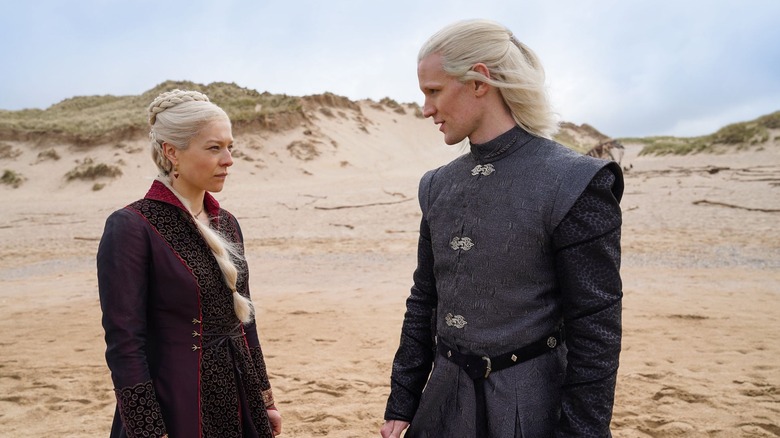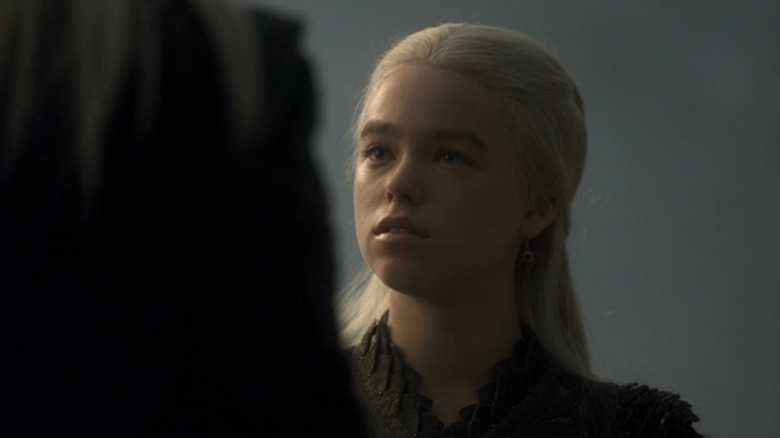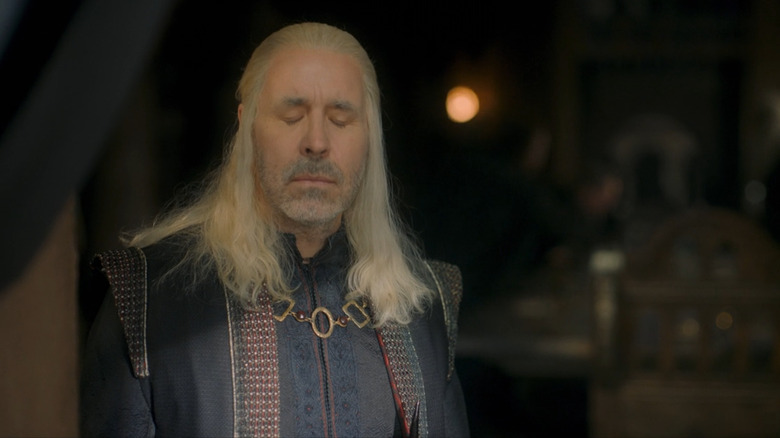Is House Of The Dragon Missing One Key Game Of Thrones Ingredient?
Understandably, viewers tend to watch "House of the Dragon" with "Game of Thrones" in mind. The show is set in the same universe with the same opening theme, and it covers the same general thematic ground. The consensus at this point seems to be that the prequel series is definitely better than the later seasons of "Thrones," but as for how it compares to the early seasons? That's debatable.
Both shows competently cover a lot of subtle political manipulations between a wide cast of characters. Unlike season 8 of "Game of Thrones," you get the sense that the writers behind this first season truly care about what they're doing, that they're not just phoning things in so they can get around to their Star Wars trilogy. However, many fans and critics have pointed out that the new show isn't particularly funny.
"'House of the Dragon' Could Benefit From Taking Itself Less Seriously," is the title of one critic's take on the series, which bemoans the lack of any Tyrion-esque character in the show so far. "You could reliably count on the fan-favorite imp to look around the room, call out the self-seriousness of it all and remind us this is supposed to be fun," the author argues. He points to other reliably amusing characters like Bronn or Tormund. Perhaps the best comparison he makes is with Littlefinger and Varys, two schemers on the small council who also deliver some pretty consistently funny dialogue. There is no such character to be found yet in the prequel series.
And honestly, that's for the best.
Why Tyrion was needed
Those who point to Tyrion are correct in that he was a wonderful character in the early seasons, someone who added much-needed levity to a show that was often unflinchingly bleak. Reading through the original George R.R. Martin books, however, it becomes clear that his sense of humor was never just in there to ease readers who are new to the fantasy genre; it's there to trick us into supporting Tyrion more than we should. Tyrion's humor establishes him as the "voice of reason" character, and by the time you get to the second book ("A Clash of Kings"), it almost seems like Tyrion is being used as a mouthpiece for the author's take on how to handle the cold-hearted political minefield of King's Landing. After all, he initially seems far more successful in his position as Hand of the King than his predecessor, while still seeming like a decent guy.
But as the books go on, it becomes clear that Tyrion's kind of a bad dude, even more so than most of the characters in this series. By the fifth book he's shaping up to be a fully villainous figure, consumed by a lust for vengeance against Cersei and King's Landing as a whole. Remember when Tyrion gave his big speech in season 4 about how he wants to burn King's Landing down? Well by all accounts, it looks like George R.R. Martin is actually planning to follow through on that speech. Book Tyrion is someone who will most likely use his role as Daenerys' adviser to subtly manipulate her into becoming the Mad Queen who burns down King's Landing. Meanwhile, the show treated Tyrion's speech as a momentary outburst, one completely unrelated to anything he did going forward.
The dangers of clinging to humor
In part because Dinklage's Tyrion was so funny and likeable, the showrunners sort of forgot that Tyrion was supposed go to down a dark path. They kept him in his role as the likeable jokester, and as a result the final season was terrible. Instead of an intelligent Tyrion deviously pushing Daenerys off the edge, the show had Daenerys fall to the dark side thanks to some absurdly bad luck as well as a string of terrible well-meaning advice given by Tyrion. The show struggled hard to make us think he was still smart, even as the plot demanded he not be.
It's a shame, because the book version of the character has an incredibly complicated, sympathetic, well-written arc around his descent into villainy. Book Tyrion's alliance with Daenerys would've been an extremely organic way to make her downward spiral feel believable as well, which the show failed to do. Tyrion serves as the perfect example of how the show's embrace of humor — which certainly seemed like a good thing at first — ended up severely damaging the later seasons. They prioritized his funny one-liners at the expense of giving him a compelling character arc, a decision that had a ripple effect on the arcs of several other major characters.
So when it comes to the lack of comedic characters on "House of the Dragon," it's worth remembering that making sure each character is compelling, complicated, and on an interesting journey is far more important. Yeah, maybe they could've made someone like Otto Hightower more of a jokester, but are we sure that would've fit with the larger story the show's telling? Not to mention...
Do we really need any more winks to the audience?
In the Collider piece arguing that "House of the Dragon" should take itself seriously, the author described the humor of "Game of Thrones" as a necessary capitulation to the audience who might be turned off by the fantasy elements: "They hung a lantern on the fanciful, usually through Jim Halpert-esque nods or quips that said to the audience, 'Yeah, we know this is a lot too.'"
Maybe those acknowledgements about the absurdity of the situation were necessary back in 2011 when adult fantasy TV wasn't mainstream, but the 2022 TV landscape is a whole different place. "House of the Dragon" is written for an audience that's already watched eight seasons of "Game of Thrones." We're already on board with the weird fantasy stuff. After you've seen the ice zombies, the Crabfeeder doesn't require much suspension of disbelief.
Not to mention that in today's TV and film landscape, the constant knowing winks to the audience have gotten a little exhausting. Movies and shows today are constantly telling its audience "yes, we know this is a lot," and it no longer feels like a relief when they do it. It feels like the writers are afraid of being earnest, that they feel the need to pre-emptively make fun of themselves in the hopes that no one else will. Telling a story that's emotionally compelling requires vulnerability, a thing so many mainstream shows and movies have seemingly replaced with constant quips.
A more understated sense of humor
As much as humor can be important for a show, it's not a positive attribute when it's done to undermine the immersion or emotional stakes of the scene. "House of the Dragon" made the right decision when it chose to take itself seriously and unselfconsciously embrace the rules and logic of its world.
Besides, it's not like the show is completely humorless. This week's episode opens with a Targaryen soldier cheering at the sight of Daemon (Matt Smith) flying into the battlefield with his dragon to save the day, only for said soldier to get squashed under the dragon's feet. It's a dark joke (like, really dark), but it's still a joke. It's one that helps to highlight the show's theme of the royalty thoughtlessly playing games with each other at the expense of the lower classes.
The show's second episode ends one of its most climactic scene with a joke too. Daemon and Rhaenyra (Milly Alcock) are at a tense standoff, one that could very well result in either character's deaths. But Daemon stands down and gives Rhaenyra back the dragon's egg she came here to get from him. But he doesn't just hand her the egg; he petulantly throws it at her as he storms off. It's peak little kid energy, delivered by a fully grown man who wants to be king. It's a joke that both reveals character and again highlights the larger themes of the show. These larger-than-life figures who think they're fit to rule are basically just entitled kids, and moments like this serve as funny reminders.
Maybe the more understated humor's for the best
Most of the comedy in this show is situational and more subtle than most. You can't convince me it's not supposed to be at least a little bit funny to watch King Viserys get hammered at a public event in this latest episode. It's hard to imagine the show isn't inviting us to laugh to some extent during the final scene of "The Rogue Prince," when Viserys reveals his marriage to Alicent (Emily Carey) to the whole high council without warning anyone in the room ahead of time. As much as Viserys' incompetence hurts everyone around him in serious ways, the show invites you to laugh at him if you wish.
Three episodes in, "House of the Dragon" has never really been humorless; it's just a show that's brave enough to take itself seriously, regardless of how weird some viewers might find it. The writers aren't concerned with throwing in self-conscious jokes to appease any nitpickers in the audience, nor have they made things so serious that there's never a moment for the audience to breathe. Maybe "House of the Dragon" doesn't have a character as funny as Tyrion yet, but so far, they're doing just fine without one.
